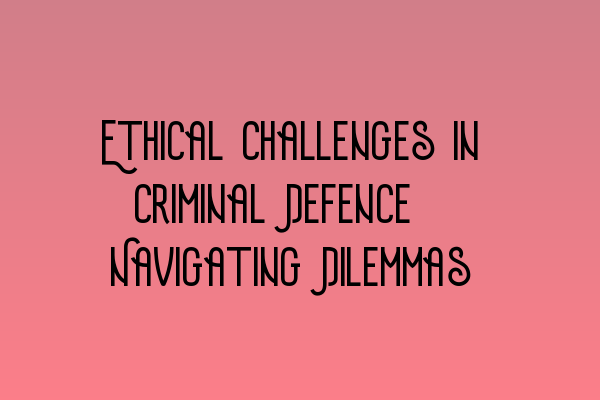Ethical Challenges in Criminal Defence: Navigating Dilemmas
Welcome to SQE Criminal Law & Practice Law UK, where we strive to provide aspiring solicitors with comprehensive knowledge and guidance. In this blog post, we will delve into the complex world of criminal defence and explore the ethical challenges that solicitors may encounter. Navigating these dilemmas requires a deep understanding of the law, strong professional ethics, and the ability to make well-informed decisions in the best interest of justice.
The Role of a Criminal Defence Solicitor
Before we delve into the ethical challenges, let’s first understand the role of a criminal defence solicitor. As legal representatives, solicitors are tasked with providing legal advice and representation to individuals accused of committing criminal offenses. Their primary duty is to ensure their clients receive a fair trial and have their rights protected throughout the process.
Now, let’s explore some of the ethical challenges that solicitors may face in their criminal defence practice:
1. Confidentiality and Privilege
Confidentiality is of utmost importance in criminal defence cases. Solicitors are bound by the obligation to keep all client information confidential and privileged. This means that they cannot disclose any information shared by their clients without their explicit consent, unless it is required by law or the prevention of a serious crime.
Understanding the boundaries of confidentiality can be challenging, especially when solicitors are confronted with situations where disclosure may be necessary. For example, if a client confesses to a crime that may endanger others, the solicitor must decide whether to breach client confidentiality for the greater good.
To navigate this ethical dilemma, solicitors must always prioritize their duty to the court and the administration of justice. They must strike a balance between maintaining client confidentiality and fulfilling their professional obligations.
2. Representing Unpopular Clients
In the course of their practice, solicitors may be faced with the task of representing clients who are accused of heinous crimes or are generally regarded as unpopular in society. This raises ethical questions about the responsibility to ensure access to legal representation for all individuals, regardless of the nature of the allegations.
Solicitors must put aside personal biases and beliefs to effectively represent their clients. They must advocate for their clients’ rights and ensure that the court process is fair and just. This ethical challenge requires solicitors to demonstrate professionalism and uphold the principle of equality before the law.
3. Resolving Conflicts of Interest
Another ethical challenge that solicitors may encounter is resolving conflicts of interest. In criminal defence cases, solicitors must prioritize the interests of their clients while ensuring they do not compromise the integrity of the legal profession.
Conflicts of interest may arise when solicitors have prior knowledge, personal relationships, or interests that may affect their ability to provide impartial advice or representation. It is essential for solicitors to identify and address these conflicts promptly to maintain the trust of their clients and the court.
4. Upholding the Duty to the Court
Solicitors have a duty to the court, which involves presenting evidence truthfully and not misleading the court. This presents an ethical challenge when clients provide solicitors with false information or insist on pursuing a defense strategy that may be misleading or unethical.
Solicitors are obligated to make professional judgments and take appropriate action when presented with such challenges. They must maintain their professional integrity and inform the court if they become aware of any false evidence or misleading statements.
In Conclusion
Ethical challenges are an inherent part of criminal defence practice. Navigating these dilemmas requires a deep understanding of the law, as well as a strong commitment to professionalism and justice. Solicitors must strive to balance competing interests and exercise sound judgment to uphold their ethical obligations.
If you are interested in learning more about the solicitor qualification process, check out our related articles:
- SQE Exam Prep: Essential Study Materials for Aspiring Solicitors
- Demystifying the Solicitors Qualifying Examination Format
- SQE Exam for International Lawyers: Challenges and Success Strategies
- LLC Formation Made Simple: Step-by-Step Guide for UK Entrepreneurs
- LLC Formation: A Step-by-Step Guide for UK Entrepreneurs
Thank you for reading our blog post. If you have any questions or would like to learn more about criminal defence practice, please don’t hesitate to contact us at SQE Criminal Law & Practice Law UK.
